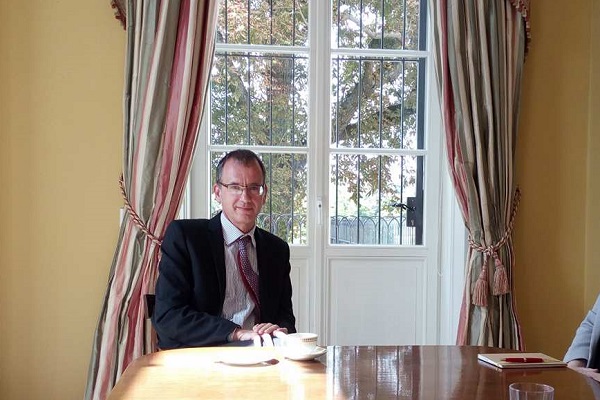
Today, at the British ambassadorial residence, British Ambassador John Marshall gave a press briefing outlining the latest position in the Brexit negotiations, saying that we are approaching another key milestone with the European Council meetings of 14 and 15 December and that there is a huge amount of activity on both sides both for the EU28 and also the EU27 (without UK) meetings.
Ambassador Marshall started off by giving a summary of the current position. As is well known, the EU has insisted for a long time that negotiations about the kind of trading relationship that will be in place after 29 March 2019 can only take place after “sufficient progress” (which Ambassador Marshall reminded us is an expression coined by the EU negotiators, not the British) has been made on the three subjects of citizens’ rights, the Irish border and the so called “divorce settlement” of the financial obligations that the UK has towards the EU during and after the negotiating period.
He claims that on the subject of citizens’ rights, whether for the 3.3 million EU citizens in the UK, or for the 1.2 million UK citizens in EU countries, progress has been such that there is a real hope that agreement can be reached prior to the December meetings, while on the Irish border progress is still being made, and that the principal delay is that the details of how the “soft” border would work in practice can only be finalised once both sides know what the post-brexit trade arrangements will actually be. The ambassador acknowledged that he doesn’t know if the EU will accept that sufficient progress has been made on this subject , but that he is optimistic. The Luxembourg Chronicle later pointed out, during a Q&A session, that to allow progress to be impeded by something that cannot be discussed until after there has been greater progress on it cannot, intrinsically, lead to progress.
As far as the divorce settlement is concerned, Ambassador Marshall’s position is that there is still progress being made, and that there is still realistic hope that it will be deemed to be “sufficient” before the December summit.
The most important additional area being discussed in parallel is the transition period during which Britain will continue to work within the existing framework on areas such as justice, borders and so on, which, although it has been generally mooted as being the two years immediately following Brexit, have not yet been agreed.
Ambassador Marshall went on to talk about the special partnership that the UK envisages in a post-brexit trading environment. Without being specific, he reiterated the official line that Britain is looking to create an “ambitious, flexible partnership that recognises the UK’s unique relationship with the EU”
When asked by Chronicle.lu to clarify what that unique relationship (beyond being a divorcing partner) actually is, the ambassador pointed out that, with a 65 million person market right on its doorstep the EU would certainly try to create a special trading relationship with the UK if we were not already in one, and that historically many of the mechanisms such as criminal justice actually work very well. In summary then, the supposed “uniqueness” is based on market size, geographical proximity and existing cooperation.
Ambassador Marshall was also asked whether he thought that the current struggle that the Germans are having to put together a coalition could have any negative impact on, or pose a delay to, the negotiations. He was firmly of the opinion that they will not. He also artfully dodged a bullet when asked about whether the very public infighting in the Conservative party signalled a weakness in the UK negotiating hand saying that there is always background noise, but the UK position is firmly aligned with Theresa May’s Florence speech of 22 September.
The ambassador says he has been talking and listening extensively to British citizens resident in Luxembourg and that while broadly their concerns reflect those of British citizens in other EU countries, there are special concerns about cross border movement, which still has to be agreed, and on family reunification, where there is work going on behind the scenes to try and accommodate the concerns.
Another briefing is expected after the December meetings.








